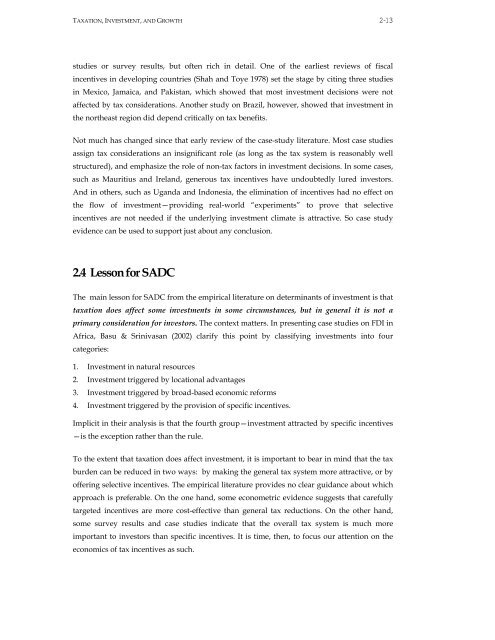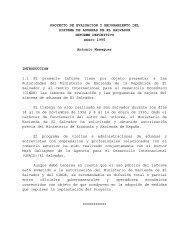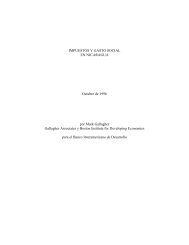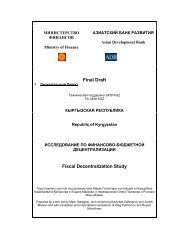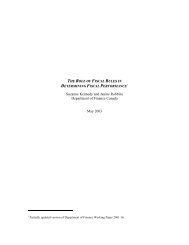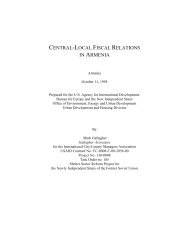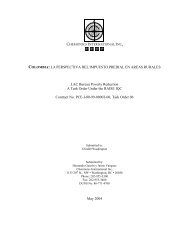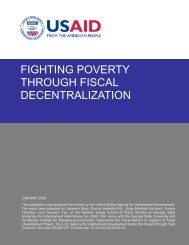Effectiveness and Economic Impact of Tax Incentives in the SADC ...
Effectiveness and Economic Impact of Tax Incentives in the SADC ...
Effectiveness and Economic Impact of Tax Incentives in the SADC ...
Create successful ePaper yourself
Turn your PDF publications into a flip-book with our unique Google optimized e-Paper software.
TAXATION, INVESTMENT, AND GROWTH 2-13<br />
studies or survey results, but <strong>of</strong>ten rich <strong>in</strong> detail. One <strong>of</strong> <strong>the</strong> earliest reviews <strong>of</strong> fiscal<br />
<strong>in</strong>centives <strong>in</strong> develop<strong>in</strong>g countries (Shah <strong>and</strong> Toye 1978) set <strong>the</strong> stage by cit<strong>in</strong>g three studies<br />
<strong>in</strong> Mexico, Jamaica, <strong>and</strong> Pakistan, which showed that most <strong>in</strong>vestment decisions were not<br />
affected by tax considerations. Ano<strong>the</strong>r study on Brazil, however, showed that <strong>in</strong>vestment <strong>in</strong><br />
<strong>the</strong> nor<strong>the</strong>ast region did depend critically on tax benefits.<br />
Not much has changed s<strong>in</strong>ce that early review <strong>of</strong> <strong>the</strong> case-study literature. Most case studies<br />
assign tax considerations an <strong>in</strong>significant role (as long as <strong>the</strong> tax system is reasonably well<br />
structured), <strong>and</strong> emphasize <strong>the</strong> role <strong>of</strong> non-tax factors <strong>in</strong> <strong>in</strong>vestment decisions. In some cases,<br />
such as Mauritius <strong>and</strong> Irel<strong>and</strong>, generous tax <strong>in</strong>centives have undoubtedly lured <strong>in</strong>vestors.<br />
And <strong>in</strong> o<strong>the</strong>rs, such as Ug<strong>and</strong>a <strong>and</strong> Indonesia, <strong>the</strong> elim<strong>in</strong>ation <strong>of</strong> <strong>in</strong>centives had no effect on<br />
<strong>the</strong> flow <strong>of</strong> <strong>in</strong>vestment—provid<strong>in</strong>g real-world “experiments” to prove that selective<br />
<strong>in</strong>centives are not needed if <strong>the</strong> underly<strong>in</strong>g <strong>in</strong>vestment climate is attractive. So case study<br />
evidence can be used to support just about any conclusion.<br />
2.4 Lesson for <strong>SADC</strong><br />
The ma<strong>in</strong> lesson for <strong>SADC</strong> from <strong>the</strong> empirical literature on determ<strong>in</strong>ants <strong>of</strong> <strong>in</strong>vestment is that<br />
taxation does affect some <strong>in</strong>vestments <strong>in</strong> some circumstances, but <strong>in</strong> general it is not a<br />
primary consideration for <strong>in</strong>vestors. The context matters. In present<strong>in</strong>g case studies on FDI <strong>in</strong><br />
Africa, Basu & Sr<strong>in</strong>ivasan (2002) clarify this po<strong>in</strong>t by classify<strong>in</strong>g <strong>in</strong>vestments <strong>in</strong>to four<br />
categories:<br />
1. Investment <strong>in</strong> natural resources<br />
2. Investment triggered by locational advantages<br />
3. Investment triggered by broad-based economic reforms<br />
4. Investment triggered by <strong>the</strong> provision <strong>of</strong> specific <strong>in</strong>centives.<br />
Implicit <strong>in</strong> <strong>the</strong>ir analysis is that <strong>the</strong> fourth group—<strong>in</strong>vestment attracted by specific <strong>in</strong>centives<br />
—is <strong>the</strong> exception ra<strong>the</strong>r than <strong>the</strong> rule.<br />
To <strong>the</strong> extent that taxation does affect <strong>in</strong>vestment, it is important to bear <strong>in</strong> m<strong>in</strong>d that <strong>the</strong> tax<br />
burden can be reduced <strong>in</strong> two ways: by mak<strong>in</strong>g <strong>the</strong> general tax system more attractive, or by<br />
<strong>of</strong>fer<strong>in</strong>g selective <strong>in</strong>centives. The empirical literature provides no clear guidance about which<br />
approach is preferable. On <strong>the</strong> one h<strong>and</strong>, some econometric evidence suggests that carefully<br />
targeted <strong>in</strong>centives are more cost-effective than general tax reductions. On <strong>the</strong> o<strong>the</strong>r h<strong>and</strong>,<br />
some survey results <strong>and</strong> case studies <strong>in</strong>dicate that <strong>the</strong> overall tax system is much more<br />
important to <strong>in</strong>vestors than specific <strong>in</strong>centives. It is time, <strong>the</strong>n, to focus our attention on <strong>the</strong><br />
economics <strong>of</strong> tax <strong>in</strong>centives as such.


